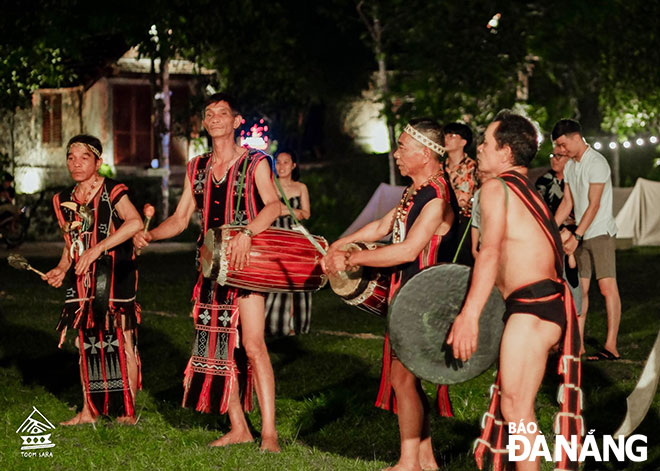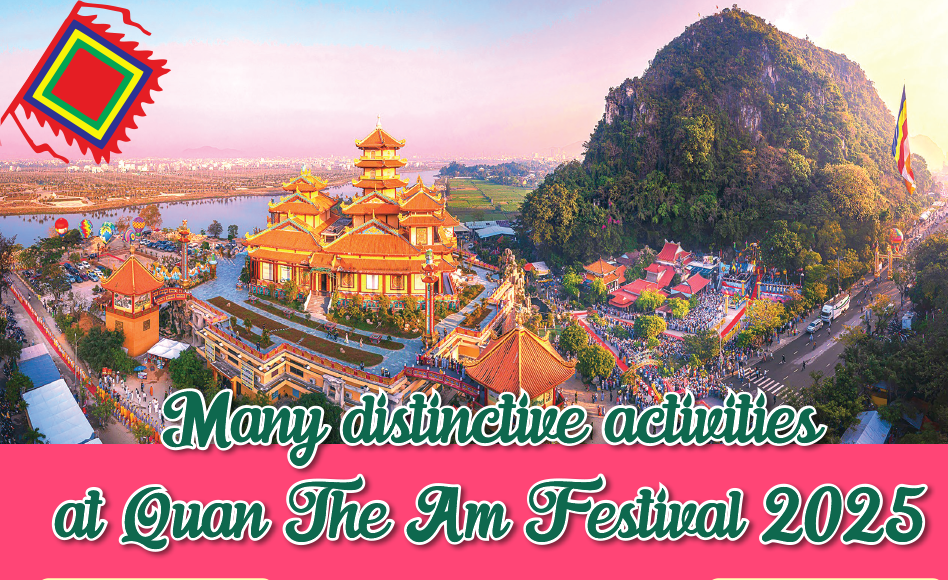Preservation and promotion of traditional musical instruments of Co Tu Ethnic group
The Co Tu Ethnic people are mainly living in high mountainous areas of Hoa Vang District, Da Nang. Since ancient times, they have played both the flute and the lute that provided a rhythmical accompaniment for singing to help them express their feelings or relieve their fatigue when going to the forest or working in their rice paddies. In particular, the sound of gongs has become an indispensable part of the "new rice" festival.
 |
| The drum and gong of the Co Tu people are introduced in the festival to serve tourists at the Toom Sara Village nestled in the Suoi Hoa (Spring Flower) eco-tourism site. |
However, the traditional musical instruments of the Co Tu people are gradually disappearing due to rapid urbanization and rapid economic growth. Therefore, local authorities must pay special attention to preserving and promoting traditional musical instruments of this ethnic minority group as these instruments are in high risk of disappearance.
Pleasure to serve visitors
In addition to farming, Mr. Alang Ui (commonly known as Alang Dung), the Toom Sara village elder, mingles with his villagers and tourists in the sound of gongs in the Suoi Hoa eco-tourism site every Saturday and Sunday. This opportunity allows him to relive his memories of the ancient times when playing the traditional musical instruments in his native land.
Initiated by Mr. Huynh Tan Phap, the Director of the Suoi Hoa eco-tourism site, the Co Tu people cultural festival not only contributes to preserving and reviving traditional cultural festivals of the Co Tu ethnic group but also help them earn extra money. The festival features 3 musical performances, namely dancing girl on a rice field, new Guol house celebration, gong festival, and singing. Currently, the traditional musical instruments of the Co Tu ethnic group are disappearing, so that the launching of the festival in the Suoi Hoa eco-tourism site to serve tourists makes the people of Phu Tuc village in Hoa Phu Commune very happy. Till date, the Suoi Hoa eco-tourism site has established a dance team specializing in serving tourists, in addition to playing gongs that provide a rhythmical accompaniment for their dancing performances in the festival every Saturday.
Mr. Alang Oi said that in the past, the Co Tu people in Hoa Phu and Hoa Bac communes could play musical instruments such as goat horn, bamboo flute (the 2-stringed instrument), bamboo trumpet, gongs (also locally known as Ching and Ca Ban). These musical instruments are now extinct but gongs are still alive.
“Many musical instruments of the Co Tu people are now extinct that leaves no opportunity for young people to learn about and play these instruments. Meanwhile, the villagers are busy with work and do not have time to practice playing our traditional musical instruments which led to disappearance. In particular, playing traditional musical instruments in wedding and funeral ceremonies are now extinct. Therefore, we hope that the local government will provide funding to encourage artisans to participate in traditional cultural activities, and establish a dance team in order to allow the Co Tu people to attend regular cultural activities,” Mr. Alang Oi remarked.
Apart from the Suoi Hoa eco-tourism site, the Nui Than Tai Hot Springs Park has also made great efforts to preserve local culture and promote it to domestic and foreign tourists in order to make it more inviting to visitors.
Mrs. Le Thi Bich Huong, the Director of Marketing and Communications of the Nui Than Tai Hot Springs Park said that the ‘Tung Tung Za Za’ dance and gongs are introduced to visitors during major public holidays and special occasions in an effort to preserve and promote the culture of the Co Tu ethnic group.
“The dance team of Phu Tuc Village leave a deep impression on the Nui Than Tai Hot Springs Park’s visitors with their unique performances in a bid to promote their local culture to tourists from around the world ", emphasized Mrs. Le Thi Bich Huong.
Preserving and promoting the Co Tu people’s culture
The musical instruments of the Co Tu people played in their festivals and daily life activities are very rich in diversity, including trumpets, flutes, and drums. In particular, the main melody in major festivals is supported by playing Corodol trumpet, gongs and other musical instruments. The sound of the trumpet is the soul of the ‘Tung Tung Za Za’ dance’s climax. However, many musical instruments have disappeared from the Co Tu community.
Mr. Do Thanh Tan, the Head of the Hoa Vang District Culture and Information Office, said that Hoa Bac Commune has only 2 people who know how to play the ‘Ta Lu' lute but no one knows how to play the remaining traditional musical instruments other than gongs.
In the past, Phu Tuc Commune had only one person who can play the Abel lute but he now no longer plays this musical instrument.
“Recently, the Da Nang government has created a plan to develop policies to support the preservation and promotion of the Co Tu people’s culture. The Hoa Vang District Culture and Information Office has retrieved traditional gong musical performance since 2018 and made it more attractive to tourists through the introduction of the ‘Tung Tung Za Za’ dance. This musical performance has been aslo introduced in many tourist sites across the district," added Mr. Tan.
Till date, the municipal administration has developed a project to issue policies to support the preservation and promotion of the Co Tu people’s culture in Da Nang in the 2022-2023 period.
By 2030, the project aims to completely preserve the traditional culture of the Co Tu people while all their traditional festivals will be restored and preserved, and all Co Tu artisans are supported in the transmission and training of their successors. Besides, importance will be attached to building the Co Tu people’s traditional cultural models. Included are cultural experience, protection of intangible cultural heritage of the Co Tu ethnic group, cultural heritage connected with heritage travel itineraries to promote the development of community-based tourism in the Co Tu ethnic group. As a result, the traditional musical instruments of the Co Tu people will be restored, passed on and preserved for future generations.
Reporting by DOAN HAO LUONG – Translating by H.L








